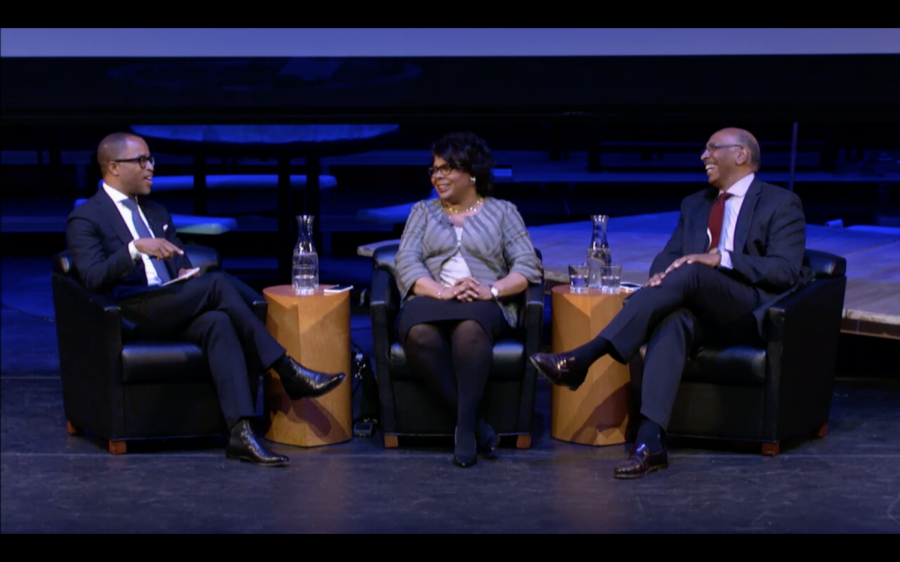In Conversation with April Ryan, Michael Steele and Jonathan Capehart
Jonathan Capehart, who sits on the Washington Post editorial board; April Ryan, White House Correspondent for American Urban Radio Networks, and Michael Steele, the former chair of the Republican National Committee, took to the stage on Monday to discuss race and politics in America.
December 5, 2017
Three people with the pulse of politics came together with the John Brademas Center and the Skirball Center for the Performing Arts to talk race and politics in America.
Jonathan Capehart, who sits on the Washington Post editorial board; April Ryan, White House Correspondent for American Urban Radio Networks; and Michael Steele, the former chair of the Republican National Committee, took to the stage at a Skirball Talk.
Steele served as chair of the RNC from 2009 to 2011, a time that coincided with the rise of the Tea Party. Ryan has covered the White House since the Clinton administration and is one of the only black women with a seat in the White House Press Briefing. Capehart has been a contributor to MSNBC and won a Pulitzer Prize in 1999 as part of the New York Daily News’ editorial board.
Before their talk, the trio sat down with WSN for an informal, off-the-cuff discussion.
Washington Square News: What have you learned about politics in the past year?
Jonathan Capehart: That we know nothing. That the president has upended everything we thought we knew about politics.
April Ryan: It’s not what your history books taught you. Old standards and guidelines have now changed. Goalposts have moved. This president has changed the dynamic of how the next group of politicians will come in and handle power. It’s shown me that partisan politics really lead the day. And it’s shown me that if you are in power, there are no repercussions.
Michael Steele: I have a slightly different perspective. I think what we’re seeing now has been information for about 10, 15 years and it has found its way finally more fully into the bloodstream because that’s exactly where the American people want it. Donald Trump is really a reflection of where people are right now and how they view various constituencies, how they view America and how they view themselves. And he every day pricks at that a little bit more. It’s a wound that traditional media, traditional political players, want to have heal, but he won’t let it heal because there is more sadistic pleasure in picking at that scab every day. I see him sitting up in the Oval Office laughing his ass off almost every day.
AR: I like your phrasing of sadistic pleasure, there is a payoff. There is a payoff, and you see that when they snub their nose and say “I got away with this.” I love your phrasing, I love the phraseology and Jonathan does too.
JC: Suddenly I have my own spokesperson. Yes, April speaks for me.
WSN: Michael, I want to ask you, how did the Republican Party get to this point after trying to espouse a more multicultural ideology in their post-mortem of the 2012 election?
MS: Well, that was a work in progress. And it goes back probably back to the early 1960s, when the Civil Rights Movement really took hold and the Southern politics of voting became much more prominent within the party. They saw an opportunity they wanted to take advantage of, and that played itself out in the 1968 election when Richard Nixon executed a Southern Strategy and decided to take into the party individuals that quite honestly the Democrats didn’t want. It played nationally, it worked to a national vote. That has been the mean that the party has followed. In the late 1970s and early 1980s, they brought in the moral majority. Now you got these old, white southern racists that had nowhere to go, then you had the moral majority come in the door and then you had, in the late ‘80s, the Reagan Democrats, the disaffected Democrats. By the time you get to 1992 was Bubba went back home and that’s how Bill Clinton won. Without Reagan, there was nothing to hold those voters. So this has been a work in time. From the second term until 2016, those voters sat largely dormant. They were disengaged and uninterested. And they grumbled and grumbled and Trump came along and he said, “I know you’re pissed, I got something for you,” and he began to reflect back to them that anger, that frustration, all those groups, all those isms, that they were pissed off about began to take hold. And I saw this as the Tea Party emerged under my watch as RNC Chairman sitting in the room with folks.
AR: This is the crazy thing to me. When the Tea Party was rising, you were rising, the Republican Party needed you.
MS: Go back and tell them that [laughs].
AR: You were their white knight.
MS: I was the countermeasure to Barack Obama because their thinking goes “Oh, they just elected a black Democrat, so let’s look around if we’ve got a comparable player.”
AR: Everyone loved the darlings, the Condis [referring to Condoleezza Rice] and the Colins [referring to Colin Powell], but at the RNC convention, everyone was cheering so loudly for Colin Powell, but when he said affirmative action, it got quiet. I wanna know, how did you keep your mind?
MS: Gin and tonic became my favorite drink. Every night and every morning.
WSN: April, how do you cover an administration and government that needs to be asked whether slavery is wrong? How do you report and analyze and think about this administration?
AR: Yes, because we are two totally different people, and I have to keep my job. I’ve been doing this for 20 years, in broadcasting for 30. When you’re in front of people like this, the basics are always on the table. What happens is that we now have to look at and broaden the scope to more than two sides. We have to look at all sides. Particularly now, you’ve got Republicans against Republicans. You’ve got six factions at least of the Republican Party. You got so many different people with so many different opinions. I believe the whos, whats, wheres, whens and whys are very pertinent. We have to look at the basics, but then you have to fall back on history. Going into journalism now and being a journalist now, we have to know what the devil is going on. I thank God that I’m of a family that taught me a lot about my culture — I don’t know everything — but they taught me about my history. What I bring to the story is the knowledge of the Confederacy, the Civil War, slavery. When you see Charlottesville, and you see the KKK and white supremacists there initially over an issue of bringing Confederate statues down, and you see anti-Jewish rallies and everything else, that’s race.
Email Sayer Devlin at [email protected].


























































































































































